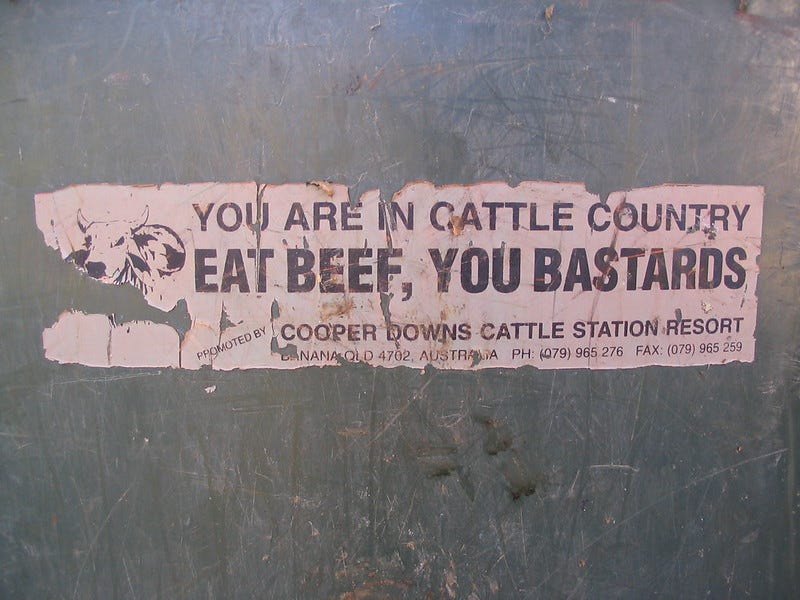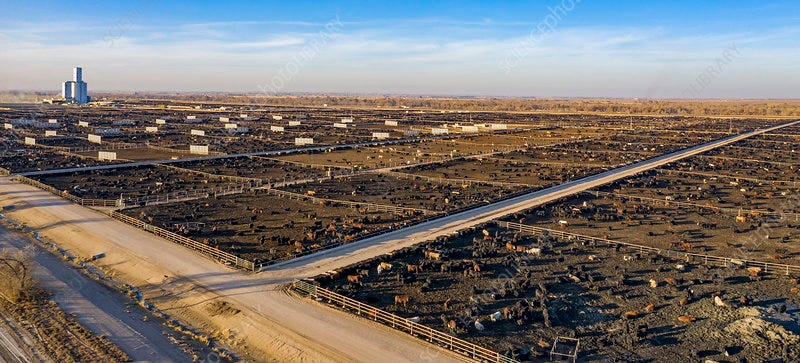Photo by Matt Herron - Cooper Downs cattle resort
When I first heard about an advertising campaign in Australia, 30 or more years ago, created because of farmers’ concerns that Aussies weren’t eating enough red meat, I laughed a lot. I thought it was brilliant because the headline summed up exactly the sentiment and action required, Eat Beef You Bastards. It travelled well on car bumpers and was plastered about towns in an effective gorilla marketing campaign.
A recent research article published in Nature Food, brings home the stark reality of the true cost to the planet of continuing to eat meat as often as we do.
What’s the issue with eating meat?
Food production creates a third of all greenhouse gases and takes up 70% of freshwater use. But animals for meat consumption is twice as polluting as growing plant-based food. 57% of all food production emissions are caused by cows, pigs, other animals and livestock feed. Only 29% comes from the cultivation of plant-based foods.
A staggering 17.3 billion metric tonnes of greenhouse gases are produced every year in food production. This figure which includes machinery, fertiliser and transportation as well as the food itself, is double the entire emissions of the US and is 35% of global emissions.
We only buy organic meat from sustainable farms
It’s true, that meat purchased from a sustainable environment where regenerative farming practices are common has to be better than the alternative, apart from not eating it at all.
JIM WEST/SCIENCE PHOTO LIBRARY. This cattle feedlot can hold 98,000 head of cattle.
But recent research now estimates that climate damage is just as high for organic meat production, as conventionally farmed meat. Livestock emissions come from burping methane for cows and sheep and manure for all animals. The grain feed also extorts a toll especially in South America where deforestation is common.
Organic livestock are reared on a much smaller scale, but they are often grass-fed, which means they grow more slowly, produce less meat and therefore spend longer alive, continuing to emit greenhouse gases.
Organic crops on the other hand halve their climate costs because there is no requirement for chemical fertiliser.
Having your meat and eat it
In December 2020, Eat Just, a San Francisco based, lab cultured (no kill) meat company, operating in Singapore, gained government approval to sell its chicken nugget through an exclusive restaurant. A Cantonese restaurant’s delivery service quickly followed on a very limited basis. The Good Meat brand, the name for their chicken, has appeared in an Asian salad, a dumpling and chicken fried rice.
Good Meat, still remains expensive and the real production costs far outstrip the $23 currently charged per ticket item. Eat Just may have been first to market, but are they really any closer to solving two major problems? First, is the issue of scaling up production in order to reduce cost. The other, finding a suitable artificial alternative to fetal bovine serum, extracted from unborn calves, to start the lab growing process. At the moment, laboratory meat is not cruelty free or likely to be available in a well-known fast food restaurant near you anytime soon.
Veggie burgers
I’ve never been a fan. It’s the same as alcohol free beer and wine. If you want the taste of alcohol, drink it, not some sugary alternative. In fairness to booze, there has been some significant improvements in recent years and this appears to be the case with plant-based burgers too.
Beyond Meat, a US, Nasdaq quoted company, has a well thought through mission statement on its web site, although it would have felt more genuine if it had included the word profits as well and what they plan to do with them.
By shifting from animal to plant-based meat, we can positively effect the planet, the environment, the climate and even ourselves.
There are 5 components in their burgers, all of which would make a dietician’s healthy list. The ingredients also enable them to mimic beef. If you want to do a cheap taste test, selective UK McDonalds are now offering the McPlant, 429 kcals of vegan burger. It still has over twice the fat of a 2oz hamburger, but most of that should have been derived from a coconut.
Here’s the real problem
I’m acutely aware that spouting percentages and offering alternatives to meat, beef in particular, is ignored by nearly all of us. And then I came across the Lancet in my research, a weekly, peer-reviewed, medical journal, which was truly arresting.
There are 7.9 billion people in the world today. By 2050, there will be 10 billion. But everyday, 820 million people already go hungry, including 150 million children. At the same time, obesity levels are rising. Over 2 billion adults are overweight and obese, with the resultant associated global deaths we all know about from diabetes, cancer and heart disease.
The Lancet brought 37 world-leading scientists together and asked them this question.
Can we feed a future population of 10 billion people a healthy diet within planetary boundaries?
They believe the answer is yes, but only if we change our eating habits, improving food production and reducing waste. They went further and developed a global planetary health diet. I don’t remember seeing anything from any media outlet reporting at Cop26, about dietary change and how this should be implemented, not withstanding The Lancet’s own planetary health reports.
The healthy highlights
I’m not going to repeat what we already know about a healthy diet. In a nutshell, eat more of the boring stuff and diversify, there are over 30,000 edible plants out there. What you might not know is how little meat we should all be eating. Don’t eat more than 98 grams of red meat per week, 203 grams of poultry and 196 grams of fish. If you want more protein and you surely will, stick to the slim meat pickings but bulk it out with your favourite legumes - nuts, beans, pulses.
They also highlight what many of us have forgotten. Take the time to cook more at home with family and friends. In a world of convenience, especially here in London, the idea of planning menus for next week is almost a quaint experience from a forgotten age. It doesn’t have to be. If there’s food leftover, which there might be if we eat more moderately, pack it away in the fridge for future consumption.
I like the fact that they recognise that this is not an all or nothing exercise. It’s about everyone, collectively making small changes for a large and sustainable positive impact.
Start as you mean to go on. I’ve got a shopping list and planned my menu for tonight. Time to surprise Mrs H. I’m sad to say, it most definitely will.



